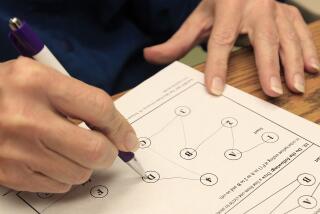One’s occupation helps determine brainpower into old age, study says
Once again, there’s proof that using your noggin to work hard pays handsome dividends -- this time, in protecting brainpower as you age. And once again, research is underscoring that for brains, too, you either use it or lose it.
In a large group of 70-year-old Scots, people who worked intellectually demanding jobs--which required flexibility, focus, problem-solving and lots of interaction with others--were smarter, and had better memories than those whose jobs were less cognitively demanding. That finding held up even after researchers accounted for early differences in intelligence, education and childhood circumstances.
Among men and women whose job description entailed the regular manipulation of complex data, not only did general intelligence hold up nicely at age 70, but so did the speed at which incoming stimuli were processed. For those whose jobs entailed complex interactions with people, general intelligence, memory and IQ were higher at age 70 than for those who worked at less complex jobs.
The latest findings are reported in the journal Neurology.
The existence of a large Scottish study of children born in 1936 (dubbed the Lothian Birth Cohort) allowed researchers to discern how much of a 70-year-old’s mental function is a result of early intelligence and how much may represent mental musculature developed in the workplace. The study participants all had been IQ-tested around the age of 11. Of those, 534 men and 532 women were tracked down around the time they turned 70 and administered a battery of cognitive tests, including IQ.
Virtually all of the subjects were retired by then. But their work histories were taken, and using a 1970s-vintage coding system developed for the U.S. census, the jobs they held were assessed for their general level of complexity in dealing with data, with people and with things.
In line with many other studies, the latest research finds that intelligence--or at least that measured by IQ tests--tends not only to be stable across a person’s lifetime, but to powerfully influence the type of work an individual undertakes. So it’s no great surprise that a child with a high IQ, after a lifetime of academic and professional challenge, will become an older person with a high IQ.
But the new research suggests that, whereas a child with more modest cognitive abilities has grown up and been drawn into complex work, he or she is more likely to become an older adult with better-than-usual mental function. And to the extent that bright children are funneled into menial occupations, they’re likely to lose some of the mental horsepower they started out with.
That makes the effect of occupational complexity pretty small, the researchers acknowledged: It may explain the 1% to 2% of the cognitive variation seen in older adults. But that is on a par with a variable such as smoking, which also marginally erodes mental performance later in life.
Interestingly, given the fact that men’s and women’s occupational paths were dramatically different in the generation examined, researchers found no major differences between the sexes in cognitive powers at age 70. Clearly, occupational complexity does not rise and fall with pay, and many of the jobs overwhelmingly held by women--including teaching--had high levels of complex human interaction.
Follow me on Twitter @LATMelissaHealy and “like” Los Angeles Times Science & Health on Facebook.







